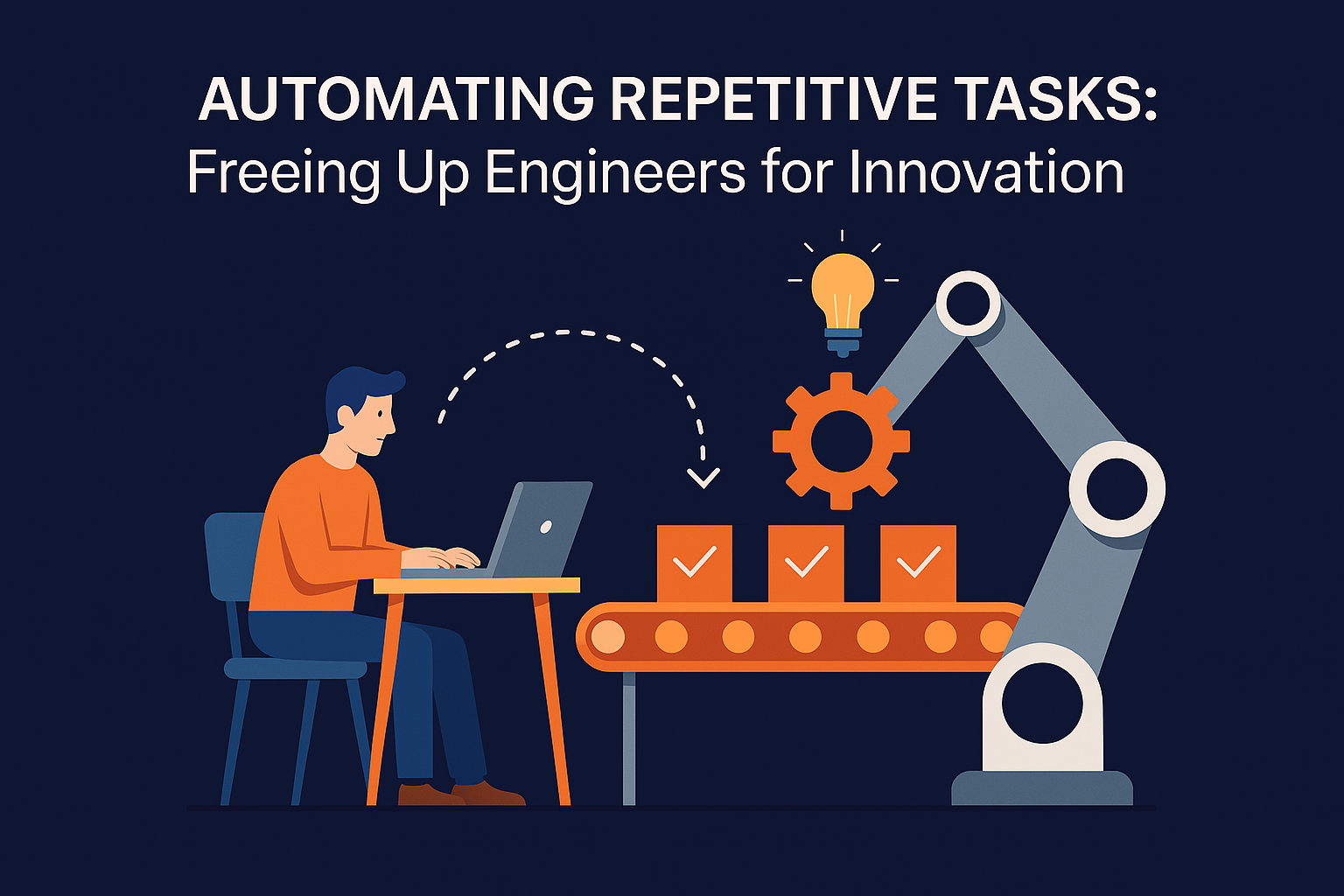Automating Repetitive Tasks: Freeing Up Engineers for Innovation

If you want engineers to innovate, you have to give them the time and mental space to do it.
Sounds obvious, right? Yet in many engineering teams, that space is eaten up by low-value, repetitive tasks - manual deployments, redundant testing, tedious configuration, routine monitoring. It’s not that these tasks aren’t important. They are. But they’re not where engineers bring their best thinking.
The answer isn’t to work harder. It’s to automate smarter.
By automating repetitive tasks, we reclaim our engineers’ most valuable resource: their attention. And when we give them back time to experiment, iterate, and think creatively, we unlock the kind of innovation that actually moves the needle.
Let’s dive into what this looks like in practice - and how to make it real.
Stop Wasting Talent on Tasks a Script Can Do
Every engineering team has some version of this story:
A senior engineer manually manages config changes across environments.
QA spends hours re-running the same regression test suite.
Someone deploys to staging with a checklist and crossed fingers.
Logs are sifted manually after every outage, again and again.
These are all solvable problems. And they’re solvable through automation.
The real cost of these tasks isn’t just time - it’s opportunity loss. It’s hours that could have been spent improving architecture, mentoring juniors, or testing new ideas. Over time, that adds up to a serious innovation tax.
Where to Start: Identify the Drains
Start by asking a simple question: Where are we repeating ourselves?
Look for the patterns that consume cycles without delivering learning or value:
Manual deployments → Use CI/CD pipelines
Redundant tests → Automate and run them on commit
Environment drift → Use Infrastructure as Code
Release coordination → Implement feature flags
Log hunting → Improve observability and alerting
Code reviews for syntax issues → Let a linter do that
In each case, automation doesn’t eliminate the task - it streamlines it, so people can focus on what truly requires human judgement and creativity.
It’s Not About Tools - It’s About Mindset
Too often, teams see automation as a “DevOps” task or something that’s only worth doing for massive scale. That’s a mistake.
Automation is about respecting your engineers’ time. It’s a commitment to removing friction and creating better developer experience. And it starts with culture, not tooling.
Ask:
Are we incentivising quick fixes or long-term simplification?
Do we have space in our roadmap for improvement work, not just features?
Are engineers empowered to automate the things that frustrate them?
When engineers are trusted to improve their own environment, they don’t just work faster - they work smarter.
What You Gain When You Automate
The benefits of automation are compounding. Here’s what it unlocks:
🔁 Consistency
Automated tasks run the same way every time. That means fewer errors, better traceability, and more confidence.
🚀 Speed
What once took hours now takes seconds. Deployments, builds, tests - all faster and safer.
🧠 Cognitive Space
Less manual toil = more focus. Engineers aren’t constantly interrupted by routine tasks, so they can dive deep into creative work.
🔍 Improved Quality
When tests run on every commit and infrastructure is version-controlled, issues are caught early and fixed quickly.
💡 More Innovation
With friction reduced, there’s time to explore, experiment, and ship better solutions - not just working ones.
Don’t Automate Everything. Automate Intentionally.
Not every task needs automation. The goal isn’t “no human input” - it’s maximising the value of human input.
Prioritise tasks that are:
Repetitive and frequent
Error-prone or manual
Low in complexity but high in time cost
Necessary for flow, but not value-generating
And automate in ways that are maintainable, observable, and trusted by the team.
Key Takeaways
✅ Repetition is a signal - if you’re doing the same thing twice, automate it.
✅ Automation is a cultural investment - it starts with leadership and mindset, not tooling.
✅ Freeing up time isn’t the goal - what you do with that time is.
✅ The ROI of automation compounds - you don’t just save time once; you save it every single day.
✅ Empowered engineers build better systems - when freed from toil, they focus on what matters most.
Final Word
Innovation doesn’t happen in the margins. It needs focus, time, and space to breathe. If your engineers are drowning in manual work, they’re not just less efficient - they’re less creative.
Automate what you can. Simplify what you can’t. And trust your teams to take the time they’ve earned and use it to build the future - not babysit the present.
Because when we stop wasting human potential on repeatable tasks, we make room for what really moves us forward.
Engineering leader blending strategy, culture, and craft to build high-performing teams and future-ready platforms. I drive transformation through autonomy, continuous improvement, and data-driven excellence - creating environments where people thrive, innovation flourishes, and outcomes matter. Passionate about empowering others and reshaping engineering for impact at scale. Let’s build better, together.
